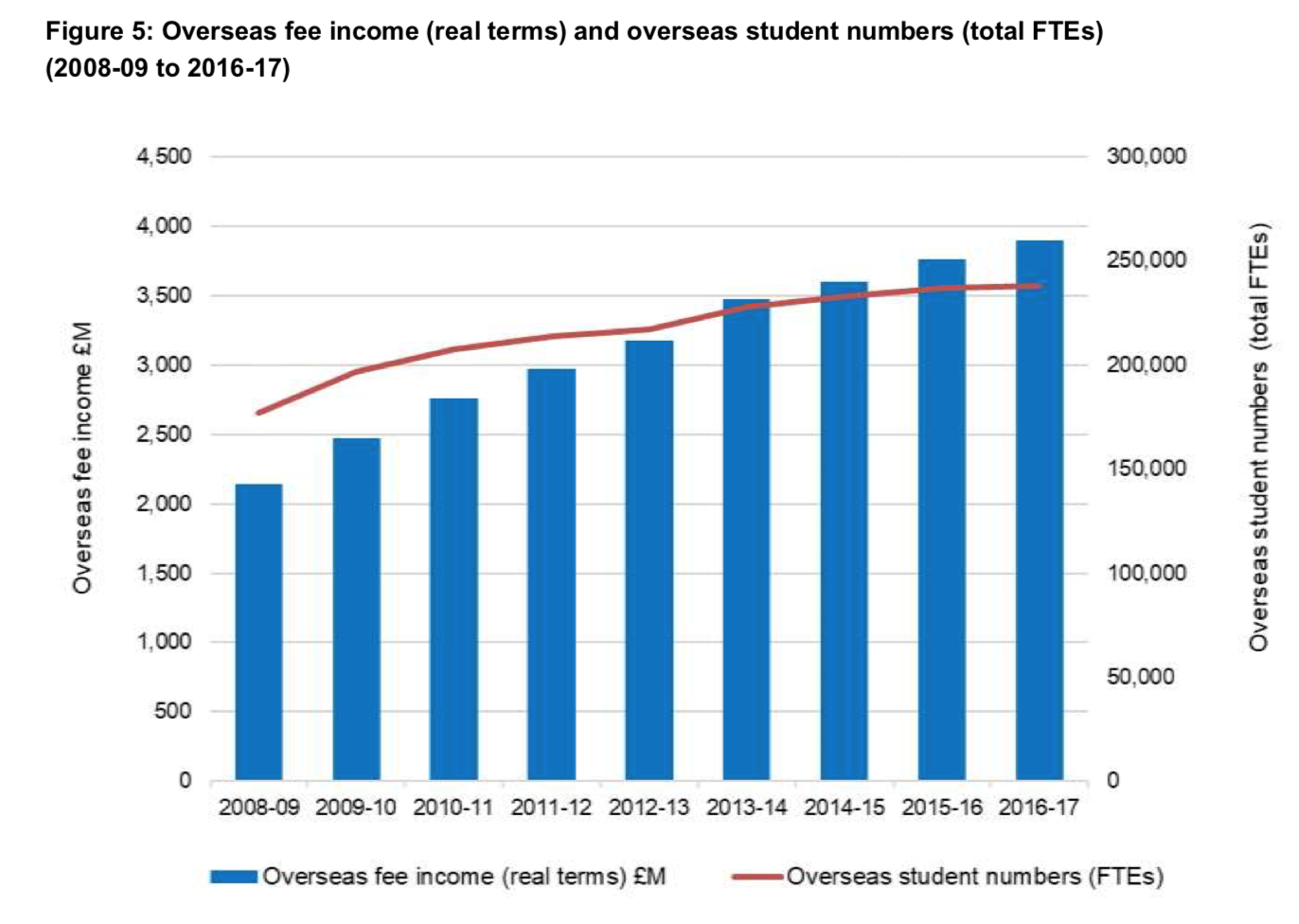English universities have been growing their income from overseas students by pushing up fees rather than recruiting bigger cohorts in recent years, a new report suggests.
But the update on university finances from the Higher Education Funding Council for England – one of its last reports before being replaced by the Office for Students – warns that there is a “limit” to how far such fee increases can go before recruitment is hit.
Overseas fee income totalled £3.9 billion for English universities in 2016-17, according to the report, a 5 per cent rise from 2015-16, accounting for 13.2 per cent of the sector’s total income.
But at the same time, the total number of full-time equivalent overseas students went up by just 0.5 per cent compared with 2015-16, increasing by a little over 1,000 FTE students to 238,158.

It is possible that a number of universities took advantage of the dramatic fall in the pound that followed the UK’s vote to leave the European Union in June 2016 by raising fees for overseas students in the knowledge that price rises would not be felt as keenly in other currencies.
However, Hefce says that, even in this exchange rate environment, further fee rises for overseas students will eventually affect demand.
“Price sensitivity is a key factor in a competitive global market, and there will be a limit to the extent to which fees can be raised further, even with the current weakening in sterling,” the report stresses.
There is also a specific reference to the sector being “particularly vulnerable” to shifts in demand from China, given that Chinese students now make up almost a third (31.4 per cent in 2016-17) of numbers from outside the EU.
Other figures in the report suggest universities with the lowest entry requirements are already being hit by falls in income from overseas students.
Specialist and highly selective institutions saw above average rises in fee income from non-EU students in 2016-17 of about 8 to 9 per cent. But “medium-tariff” universities that have lower entry requirements received only about 3 per cent more money from overseas students and low-tariff institutions had a drop in such income of almost 6 per cent.
This may raise concerns that government policies that have appeared to be more friendly to research-intensive institutions – such as a pilot on easing visa rules – could be harming other institutions.
Meanwhile, the report also draws attention to large variations in domestic student recruitment in the latest data on admissions.
Although there was an overall 0.8 per cent increase in undergraduate entrants for 2017-18, admissions dropped at 60 institutions, with the average fall at these universities being 8 per cent. And in terms of next year, it again points to higher-tariff institutions – where applications are up 2 per cent compared with falls of 5 and 2 per cent for low- and medium-tariff universities – faring better.
Overall, the report says universities’ finances “are sound overall, and are more favourable than projected in July 2017” but highlights the “wide variation” in performance, with 24 institutions reporting deficits in 2016-17 compared with 11 in 2015-16.
There is also explicit reference to the ongoing pensions dispute, with the hike in the Universities Superannuation Scheme’s estimated deficit showing “the inherent volatility in the valuation outcomes of the sector’s pension schemes. This poses potentially significant uncertainty and risk to the ongoing financial sustainability of HEIs,” the report says.
Find out more about THE DataPoints
THE DataPoints is designed with the forward-looking and growth-minded institution in view
Register to continue
Why register?
- Registration is free and only takes a moment
- Once registered, you can read 3 articles a month
- Sign up for our newsletter
Subscribe
Or subscribe for unlimited access to:
- Unlimited access to news, views, insights & reviews
- Digital editions
- Digital access to THE’s university and college rankings analysis
Already registered or a current subscriber? Login








